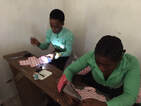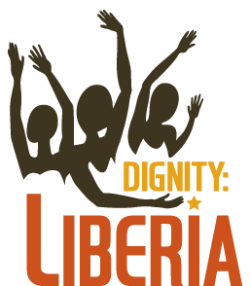
Liberia’s Ministry of Health (MOH) was so impressed, they invited us to return in order to show high school teachers how to make these pads. We were pleased to be invited and were excited that last year’s volunteers were able to return for this project in March of 2020. Emma Katakpah, Clinical Coordinator for Fistula with Liberia’s MOH, was interested in and supportive of Dignity:Liberia and the sewing project. She attended each session, supervising the volunteers from the Ministry of Health.
While a number of the students were learning to make the reusable pads for personal use, some planned to teach others their new found skills, or even sell what they make.
One attendee, Victoria, is a fistula survivor we had previously met at the Phebe Rehab Center. She now has her own sewing business in Monrovia. She came to our class to learn to make the sanitary product which she can make to sell. This will be good for her and for those who can purchase reusable sanitary pads at a reasonable price.
There also were 4 or 5 men in attendance. One young man is a teacher at the junior college. He plans to teach young women how to make pads. He came to all of our sessions and helped teach after the first one. Some of the young men were high school students and were going to give the pads they made to someone at home. One young man said he planned on teaching his sisters. Menstruation is a somewhat taboo topic in Liberia, particularly among men, so this is quite significant.
A lot of preparation went into assembling the kits that were given to each class participant. Some wonderful women at First Baptist Church of Lee’s Summit donated their time to help make 130 hygiene pattern kits to send to Liberia. When Martha Griffin, who took the kits to Liberia, learned that there would be three days of classes, she knew she needed more kits.
She put us to work, starting on our first day in Liberia. I recall separating stacks of material, cotton from flannel and bagging scissors, thimbles, and pin cushions (which Martha made prior to returning to Liberia), while Dr. John Grechus counted out needles and added other items to each kit. Others cut and stitched cloth. Our efforts increased the number of kits to 260.

Although the materials we used in class were brought from the United States, we made sure that the girls and women would be able to obtain supplies locally. For example, the plastic bags from water sold in the streets, can serve as barriers inside the pads. Old T-shirts or baby blankets can be used as fabric. Buttons, string, and snaps can be substituted in the absence of Velcro.
Because only one student had access to a sewing machine, we taught the ladies how to sew the kits into hygiene products by hand. Everyone who attended displayed patience, determination, respect, and a willingness to learn. They listened and carefully followed directions, clearly wanting to learn. Their respect for anyone trying to help them was evident. They were kind and helpful to each other as well. Working with such model students was a joy. They all finished or were close to finishing their projects and we are confident that they will be able to reproduce the sanitary products.
The overwhelming majority of the ladies left class with at least one completed pad and instructions to make more. We taught 173 individuals (about 100 teachers and 73 younger students) how to make feminine hygiene products.
We are grateful to the many caring friends at home who helped provide supplies to make this project possible. We are also grateful to Liberia’s Ministry of Health for their support and the volunteers who came to assist. Finally, we are grateful to the many teachers who took the time to learn how to sew reusable menstrual pads. As they teach others this craft, it will greatly increase the number of girls and women who can make their own kits, giving them a chance to complete their education and have more choices for their future.

 RSS Feed
RSS Feed